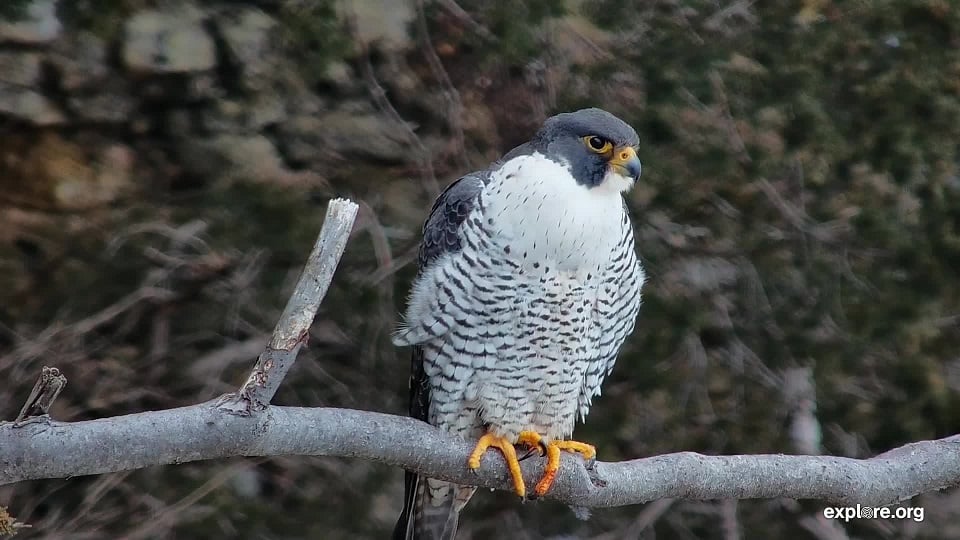How long do peregrine falcons live and/or reproduce? This question was inspired by a discussion in the Midwest banding group last week. Jackie Fallon of the Midwest Peregrine Society shared a Facebook post about Hunter, a 21-year old male peregrine falcon who was rescued in Toronto, Canada. Hunter is the oldest known wild-producing falcon in North America: https://www.facebook.com/Canadian-Peregrine-Foundation-149280041803853/.
The Manitoba Peregrine Falcon Recovery Project followed up with the story of Princess, a 19-year old falcon who was rescued in Winnipeg, Canada. We have a personal connection to Princess, since she hatched at Xcel Energy’s Riverside plant in 2002. Her father Lightning hatched at Xcel Energy’s Sherco plant in 1998, and Lightning’s mother was released in La Crosse, WI in 1991. Please read this blog: it perfectly captures how we as banders and caretakers feel about our birds: http://www.species-at-risk.mb.ca/pefa/blog/2021/07/an-experience-of-a-lifetime/.

Great Spirit Bluff peregrine falcon Michelle at fifteen years old
I went to the Midwest Peregrine Falcon database to pull longevity records. These are the oldest falcons that I could find:
Female Falcons
| Princess: 19 years old |
30/B: 18 years old |
Michelle: 16 years old |
Dot: 14 years old |
| Freedom: 19 years old |
Meg: 18 years old |
Sibella: 15 years old |
|
| Chantal: 18 years old |
Camilla: 17 years old |
Mae: 15 years old |
|
Average lifespan of female falcons over a year old: *6.54 years
Average span of top ten oldest female falcons: 16.8 years
Male Falcons
| Trey: 21 years old |
Hubert: 19 years old |
MPR2: 17 years old |
Will: 15 years old |
| Hunter: 21 years old |
James: 18 years old |
Hugo: 16 years old |
|
| Kinney: 19 years old |
Squawker: 18 years old |
Kato: 16 years old |
|
Average lifespan of male falcons over a year old: **5.59 years
Average span of top ten oldest male falcons: 17.7 years
Reproductive capacity and age in female falcons
Female falcons hatch with all of the egg cells they are ever going to have. Is it possible for a wild female peregrine falcon to go through menopause? Does fertility decline as falcons age? I looked at the reproductive history of the top ten oldest female falcons and found a pretty mixed bag.
- Freedom did not lay eggs the last six years of her life. This suggests that she went through the falcon equivalent of early menopause, but without an autopsy, we can’t know for sure.
- Prior to MPFR’s report, Princess was last seen in 2018. I don’t know whether she nested between 2018 and her rescue this year.
- Several falcons on the top ten list laid eggs until the end of their lives, but a number of them had lower lay-to-hatch ratios in their last two or three years. Some of them laid less eggs, a few of them laid ‘squishy’ or abnormally shaped eggs, and others laid eggs that looked normal for all intents and purposes – they just didn’t hatch.
- 17-year old Camilla produced fertile eggs until she died.
We don’t know for sure whether very old wild female peregrine falcons go through menopause, although there are at least two that could have done so based on bander observations. A stronger argument can be made for age-related fertility decline among the small percentage of female peregrines that live longer than fifteen years. But our sample size is very small and a lot of things impact fertility and production, including diet, illness, temperature, weather, and mate survival, which means that all of us banders need to do a lot more research before we have an answer. We’ll keep watching, learning, and sharing data and we hope you do, too! More than anything, these complicated questions underline the importance of monitoring nests, getting band numbers, sharing data, and asking questions as we seek to understand the complex and ever-changing lives of the birds we watch.
Additional links and information
I did a fair amount of reading about avian fertility. Unsurprisingly, economically-valuable domestic fowl were the most commonly studied species. I was surprised to learn how many factors could influence the production of fertile eggs via AI or roosters! But this paper was interesting and a little unsettling: https://www.nature.com/articles/s41467-021-20937-7. So ratite birds like Ostriches are very distantly related to falcons and we haven’t seen temperatures get too hot for falcon egg production in late March and mid-April. But I have to wonder how rising temperatures are impacting egg production in wild birds that produce a first clutch in May or June and second clutch later in the year.
Who was our oldest falcon? Michelle at Great Spirit Bluff produced 22 young over her lifetime and was 16 years old when she disappeared. You can watch the Great Spirit Bluff falcons here: https://www.raptorresource.org/birdcams/gsb-falcons/.
* The average lifespan sample size for female falcons was 118 individuals over one year old.
** The average lifespan sample size for male falcons was 47 individuals over one year old.
 The Raptor Resource Project
The Raptor Resource Project The Raptor Resource Project
The Raptor Resource Project